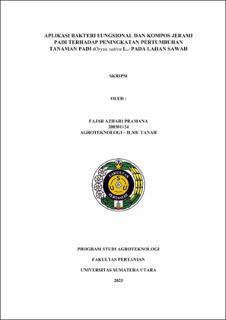| dc.description.abstract | This study aimed to determine the effects of applying functional bacteria and
rice straw compost, as well as their interaction, on the growth enhancement of rice
plants (Oryza sativa L.) in paddy fields. The research was conducted in a
greenhouse and the Soil Biology Laboratory of the Faculty of Agriculture,
University of North Sumatra, from October 2024 until completion. The study used
a Randomized Block Design (RBD) with two treatment factors and three
replications. The first factor was the functional bacteria with four levels: no
bacterial application (B0), Burkholderia gladioli (BG), Enterobacter sichuanensis
(ES), and Achromobacter xylosoxidans (AX). The second factor was the application
of rice straw compost with three levels: no compost (K0), 50 g/polybag (K1), and
100 g/polybag (K2). Observed parameters included soil pH (H₂O), plant height
(cm), number of tillers, flowering age, fresh weight of rice plants, fresh root weight,
dry plant weight, dry root weight, weight of 1,000 grains of rice, and soil microbial
population.The results showed that the application of functional bacteria
significantly increased plant height, number of tillers, fresh plant weight, fresh root
weight, and soil microbial population, with Achromobacter xylosoxidans (AX)
being the most effective treatment. The application of rice straw compost
significantly enhanced plant height, number of tillers, flowering age, and fresh plant
weight, with the best dosage being K2 (100 g/polybag). The interaction between
functional bacteria and rice straw compost significantly increased plant height and
number of tillers, with the best combination treatment being AXK2. | en_US |


